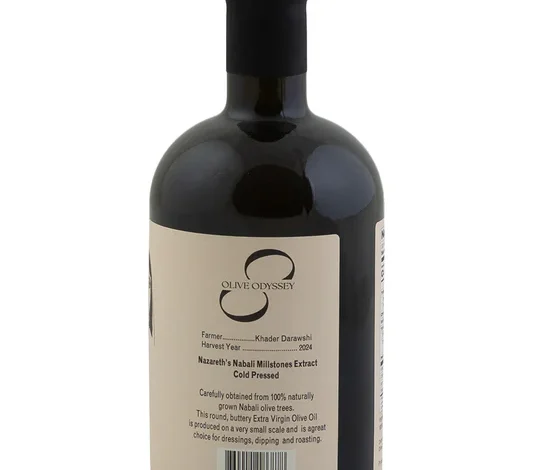7 Reasons Dutch Households Are Switching to Palestinian Olive Oil

Across the Netherlands, a silent but powerful transformation is happening in kitchens from Amsterdam apartments to the rustic and countryside homes in Friesland. Dutch families are paying closer attention to what they put on their plates. Organic produce, whole grains, and traceable proteins are no longer niche; they’re becoming the norm. One standout in this shift is Palestinian olive oil, and the numbers tell the story. At Dadels Kopen, we’ve seen rising demand from customers who care about quality, health, and ethics. But what’s really behind this change?
Let’s explore the seven core reasons why Dutch households are making the switch to Palestinian olive oil and why the movement is growing fast.
1. Pure and Authentic; Just the Way Nature Intended
The oil you choose for your meals matters. Palestinian olive oil being cold pressed and unfiltered is exceptional as it sustains all its nutrition and flavors. Unlike industrial oils, whose essence has been stripped off during high heat refining, Palestinian olive oil from Dadels Kopen is treated with care, from harvest to bottle.
The result? A golden-green oil with a smooth texture and a deep, slightly peppery taste. Dutch customers often tell us it reminds them of something real, something untouched. This authenticity is impossible to replicate in mass-market production lines.
At Dadels Kopen, our oil comes directly from small, family-run farms in Palestine, where ancient trees are lovingly tended without chemicals or shortcuts. The olives are picked by hand, processed within hours, and stored with precision. No additives. No preservatives. Just nature in a bottle.
2. Backed by Science; Rich in Nutrients and Good for Your Body
Dutch families are more health-conscious than ever, and for good reason. With rising awareness about cardiovascular issues, diabetes, and inflammation-related conditions, choosing functional foods is now part of daily life.
There are polyphenols in Palestinian olive oil, loaded with a natural substance that reduces oxidative stress and supports the heart. In addition, it is an incredibly rich source of monounsaturated fats, specifically oleic acid, which lowers bad cholesterol without touching the good kind. These benefits are supported by real time scientific research published in The New England Journal of Medicine and The European Journal of Clinical Nutrition.
But it doesn’t stop there. The antioxidants in the oil help reduce joint pain, protect skin from aging, and even support cognitive function. Many of our customers at Dadels Kopen say they feel the difference of clearer energy, better digestion, and a more stable mood.
And because our oil is unrefined and bottled quickly after pressing, all those benefits remain intact when it reaches your kitchen in the Netherlands.
3. Transparency and Traceability
Today’s Dutch shoppers want more than just flavor; they want to know the story behind the product. Where did it come from? Who made it? Was it produced with care?
At Dadels Kopen, we provide full traceability. Every bottle of our Palestinian olive oil comes from olive groves we know personally. These are not industrial operations, they’re generational farms that rely on tradition, not chemicals. The olives are grown without pesticides, harvested by hand, and cold-pressed using stone mills.
We provide full transparency on each shipment, including harvest dates, bottling records, and quality tests. This is why our customers trust us not just because the oil tastes great, but because it comes with honesty and accountability.
4. Mediterranean Living, Dutch Values
For ages, the Mediterranean diet remains one of the healthiest diets in the world. What’s its core ingredient? Olive oil. But not just any kind. Authentic, extra virgin, cold-pressed oil. That’s exactly what Palestinian olive oil brings to Dutch tables.
More and more households in the Netherlands are shifting from butter and seed oils to the consumption of olive oil for cooking purposes, dressing salads, roasting vegetables, and even baking. It enhances flavor without overwhelming it. It nourishes without adding processed fats.
At Dadels Kopen, we encourage customers to try a tablespoon of our oil with lemon juice in the morning. It’s a traditional wellness ritual from the Middle East. Many report better digestion and more stable energy throughout the day.
Integrating Palestinian olive oil into a Dutch lifestyle is seamless. Whether it’s drizzled on a kaasbroodje, paired with local cheeses, or used in a Sunday roast, its versatility fits beautifully with everyday meals.
5. A Purchase That Supports Fair Trade and Sustainable Agriculture
Switching to Palestinian olive oil is more than a personal health decision; it’s a conscious economic choice. Dutch families are increasingly aware of their impact as consumers. They want their money to support real people, not faceless corporations.
By buying from Dadels Kopen, customers help support Palestinian farmers who rely on olive cultivation as their primary source of income. These farmers face immense challenges—from limited access to water, to geopolitical restrictions—yet they continue to grow some of the world’s finest olives with pride and skill.
Our supply chain is direct and fair. We pay above-market prices, reinvest in farming communities, and maintain long-term partnerships. Every drop of oil sold in the Netherlands represents a step toward economic dignity and sustainable agriculture in Palestine.
This kind of transparent, ethical sourcing is rare and Dutch consumers are recognizing its value.
6. Freshness and Flavor
Mass-produced olive oils can sit on shelves for months or years, losing their taste and nutritional value. In many cases, what reaches your table is stale or even blended with other oils.
At Dadels Kopen, freshness is our guarantee. We import our oil in small batches, always from the most recent harvest. Our storage practices follow strict European food safety standards, and each bottle is sealed to preserve aroma and antioxidants.
When customers open a bottle, they immediately notice the scent—grassy, herbal, and alive. The taste is clean, slightly fruity, and finishes with a gentle burn at the back of the throat—this is the signature of high polyphenol content, and a mark of true extra virgin quality.
Once they try it, Dutch families rarely go back to supermarket oil. The difference is not just noticeable; it’s unforgettable.
7. Perfect Match for Dutch Culinary Habits
The Dutch food culture is rooted in simplicity, freshness, and balance. That’s exactly where Palestinian olive oil shines.
It lifts the flavor of boerenkool stamppot. It blends beautifully with Dutch cheeses like gouda or edam. It brings out the richness in locally caught fish or adds a finishing touch to hearty sourdough bread.
Even in sweet dishes, a drizzle of this oil adds a subtle, nutty complexity. It pairs wonderfully with honey, dates (which we also offer at Dadels Kopen), and spiced pastries.
What makes this oil ideal for the Dutch kitchen is its balance; it doesn’t dominate the dish, it enhances it.
Conclusion
This movement isn’t a trend. It’s a reflection of deeper values. Dutch households are choosing foods that are clean, honest, and meaningful. They want nutrition without compromise. Flavor without chemicals. Transparency without marketing gimmicks.
Palestinian olive oil offers all of that and more. And at Dadels Kopen, we’ve made it easier than ever to bring this legacy-rich oil from Palestinian groves to your Dutch kitchen.
From health benefits and unmatched flavor to ethical sourcing and total traceability, the reasons to switch are strong and growing.




